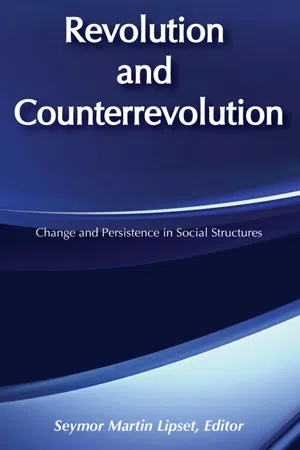
Revolution and Counterrevolution
Change and Persistence in Social Structures
- 436 pages
- English
- ePUB (mobile friendly)
- Available on iOS & Android
About This Book
This collection of Lipset's major essays in political sociology is in a real sense a follow-up or sequel to Political Mind and The First New Nation. It provides a broad panorama of continuing interest, developing a sociological perspective in comparative and historical analysis, with particular reference to politics, modernization, and social stratification. Robert E. Scott in The Midwest Journal of Political Science, said ""this book has an essential unity. The subjects discussed are interesting and important to the political scientists and the observations offered stimulating and significant. Both the student and the mature scholar can benefit."" Professor Lipset describes this collection of his major essays in political sociology, as ""in a real sense a follow-up or sequel to Political Man and The First New Nation. This volume provides a broad panorama of continuing interest, developing a sociological perspective in comparative and historical analysis, with particular reference to politics, modernization, and social stratification. The opening section of the book contains, in addition to a valuable new introductory chapter, essays that interpret varying levels of socioeconomic development in the United States, Canada, and Latin America. Other essays deal with such matters as the contrasting modes of modernization in Europe and Asia, the role of values and religious beliefs in the emergence of political systems, the effect of religion on American politics from the founding of the Republic to the present. A concluding section analyzes major works of political sociology in the light of contemporary ideas. Many chapters have been revised to include recent data.Seymour Martin Lipset is Munro Distinguished Professor of Political Science and Sociology at Stanford University, and Senior Fellow at the Hoover Institution on War, Revolution, and Peace. Prior to his current appointment, he was Markham Professor of
Frequently asked questions
Information
Table of contents
- Cover
- Half Title
- Title Page
- Copyright Page
- Dedication Page
- Introduction to the Transaction Edition
- Table of Contents
- Part 1. • Introduction: Comparative Sociology and History
- Part 2. • Value Differences: Historically and Comparatively
- Part 3. • Social Stratification and Politics
- Part 4. • Political Cleavages in Comparative Perspective
- Acknowledgments
- Index